Our Jizca Chia Zhue Festival
What is the Jizca Chia Zhue Festival?
The sun and moon festival is a community meeting related to the festivity culture, where Mhuysqas de Bosa families, through food, drinks, traditional games and sharing of voices, brings people together to weave (link) family and community networks which have deteriorated since the arrival of the city.
Nowadays, in this festival are shown and developed the cultural practices, traditions, uses and customs of the Mhuysqa de Bosa community, whose native people, descendants of the ancient indigenous people, keep the knowledge that is being strengthened and recovered so that it won’t be forgotten or destined to the silence either.
This incredible meeting brings life to religious celebrations and bazaars made before in Bosa. Besides, it safes some practices done before for these dates when the festival is carried out, traditional activities such as the prizes rod (San Pedro celebration) or the pilgrimage around Bosa (San Isidro Labrador celebration), giving them the real meaning of, as practices and activities with traces from the Mhuysqa community. At the same time, reclaiming and defending an ancestral legacy which has been returned to the Muisca folk, taking into account the rituality, the holy plants and the understanding of the cosmovision about the territory.
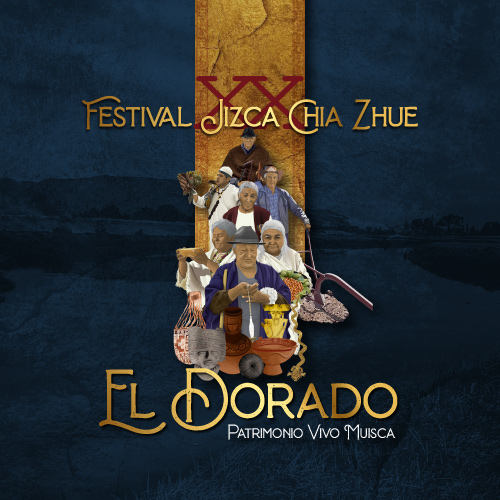
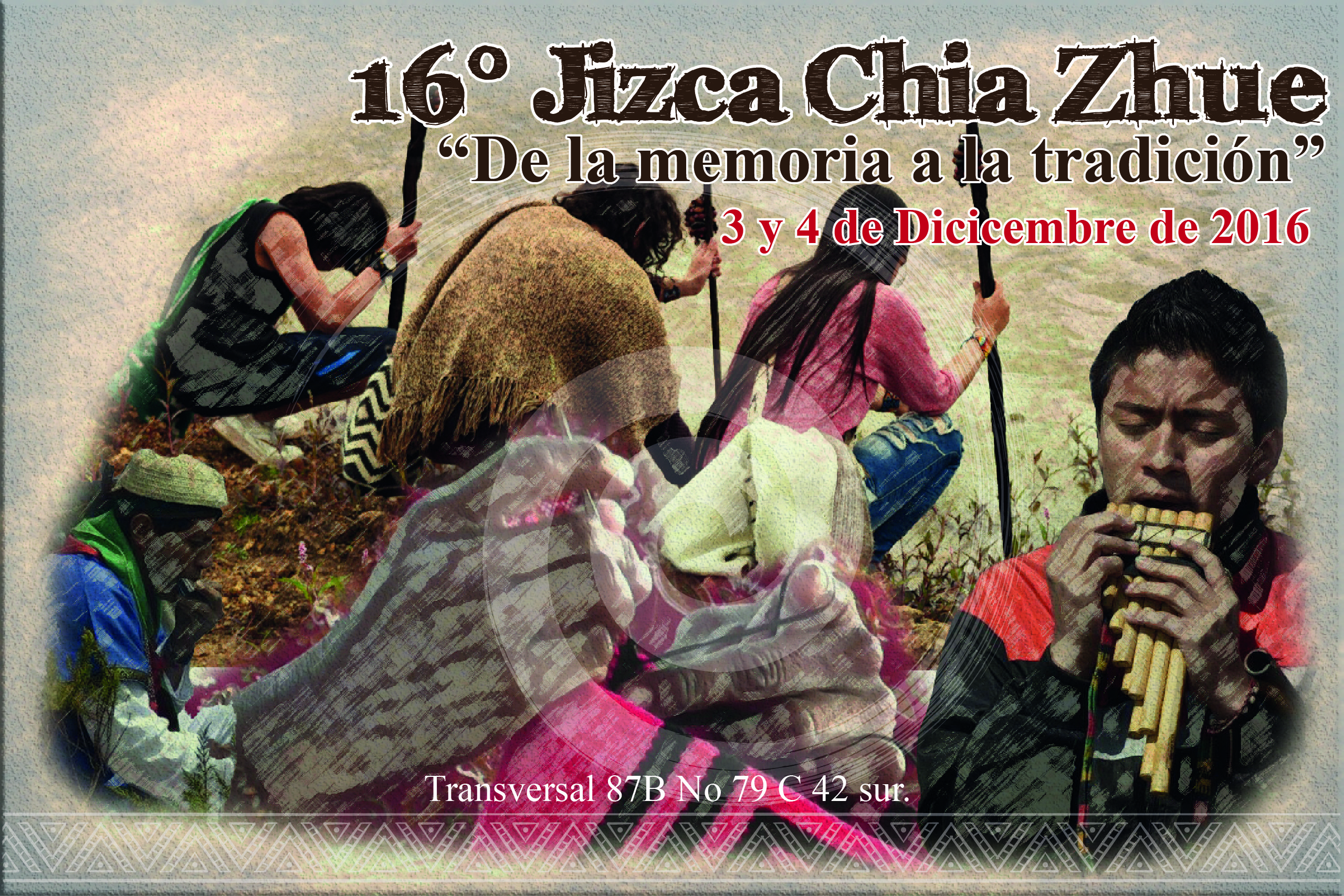
- HISTORY (TOPICS)
In the cultural tradition of America's indigenous peoples, there are very special dates such as solstices and equinoxes for paying homage, making pagamento rituals to the Sun and the Moon. These communities sing, dance and offer their most significant rituals to express their gratitude because of the crops, in a payment singing to the elements sun, earth, air, fire and water, which are the vital parts of their life and ancestral culture in order to keep the natural harmony.
The Indígena Mhuysqa community since its origin has celebrated fiestas in gratitude to Mother Earth for everything what was received due to her. Therefore, it’s important to keep in mind three moments, the meetings for developing ritual, healing or celebration activities. The above saw from a cultural component that evidence two general moments in the community. The first one and giving a solution to the syncretism that is presented today in the community, it’s necessary to understand and present the role that plays the acculturation process -for which the native community from the cundiboyacense territory, today resided in the locality Bosa- faced in the time of the wrong called “conquest”.
In fact, there were syncretism and blending processes generated due to original practices and beliefs that the colonial population juxtaposed over the native indigenous population. Nowadays, creating different kinds of meetings from different perspectives with only an indigenous and traditional background. In those past moments mentioned, it's possible to analyze the community's own features in which were developed activities or dance meetings, relating the knowledge of the community about the lunar cycles and the right places for making pagamento in the community’s territory, where were carried out the meetings of the community. Taking into account that these holy places were subsequently officialized by the catholic church and which should be thought from different moments identifying the true feeling of the community about them.
Consequently, for more than 20 years the Cabildo Indígena Mhuysqa de Bosa making a conscious effort to keep the ancestral celebrations alive, brings back the Jizca Chia Zhue Festival (Wedding of the Moon and Sun). An intercultural meeting with the purpose of strengthening their culture and promoting it in the community who belong to the locality. This celebration is done during 3 consecutive days every year, in the San Bernardino village of Bosa, place with the highest number of the Indígena Mhuysqa population.
According to chronology, the festivals have been:
- 2003 - III Festival de Chie y Sue, own resource, October 11th and 12th.
- 2005 – V Festival del Sol y la Luna, own resource, October 15th, 16th and 17th.
- 2006 – VI Festival de la Luna y el Sol,own resource, October 13th, 14th and 15th.
- 2007 – VII Festival Jizca Chia Zhue, support by mayoral, June 30th, July 1st and 2nd.
- 2008 – VIII Festival Jizca Chia Zhue, support by mayoral, June 28th to 30th.
- 2009 – IX Festival Jizca Chia Zhue, support by mayoral, June 12th to 22nd.
- 2010 – X Festival Jizca Chia Zhue, el vuelo del Kinzhá (the flight of the Kinzhá), support by mayoral, September 5th to 15th.
- 2011 – XI Festival Jizca Chia Zhue, camino hacia la memoria y sabiduría Mhuysqa (pathway/walking towards Mhuysqa memory and wisdom), support by mayoral, August 13th to 15th.
- 2012 – XII Festival Jizca Chia Zhue, camino de sanación del territorio (pathway to the healing of the territory), support by mayoral, November 10th to 12th.
- 2013 – XIII Festival Jizca Chia Zhue, reviviendo huellas ancestrales (reviving ancestral footprints), support by mayoral, November 9th to 11th.
- 2014 – XIV Festival Jizca Chia Zhue, Por la Reivindicación del Territorio Ancestral (To the recognition of the ancestral territory), support by mayoral, November 1st to 3rd.
- 2015 – XV Festival Jizca Chia Zhue, por la Reivindicación Cultural del Pueblo Muisca (To the cultural recognition of the Muisca folk), support by mayoral, July 18th to 20th.
- 2016 – XVI Festival Jizca Chia Zhue, De la Memoria a la tradición (From the memory to the tradition), own resources, December 3rd and 4th.
- 2017 – XVII Festival Jizca Chia Zhue, De la Memoria a la tradición (From the memory to the tradition), support by mayoral, March 18th to 20th.
- 2019 – XVIII Festival Jizca Chia Zhue, Entre memorias mitos y leyendas (Among memories, myths and legends), support by mayoral, June 22nd and 24th.
- 2019 – XIX Festival Jizca Chia Zhue, Tejiendo memoria y cultivando semilla Mhysqa (Weaving memory and growing Mhysqa seed), support by mayoral, December 14th and 15th.
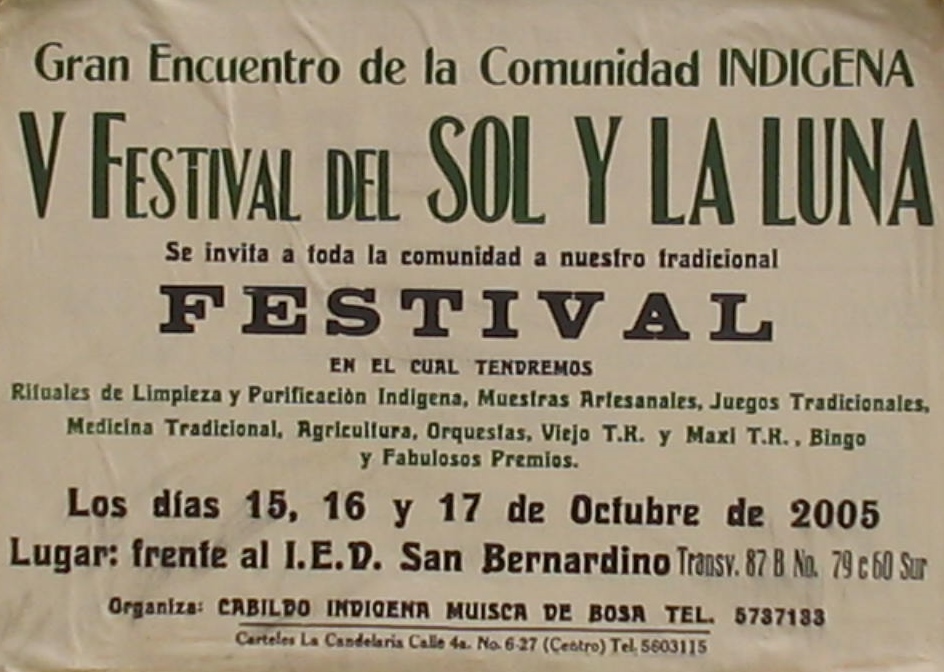
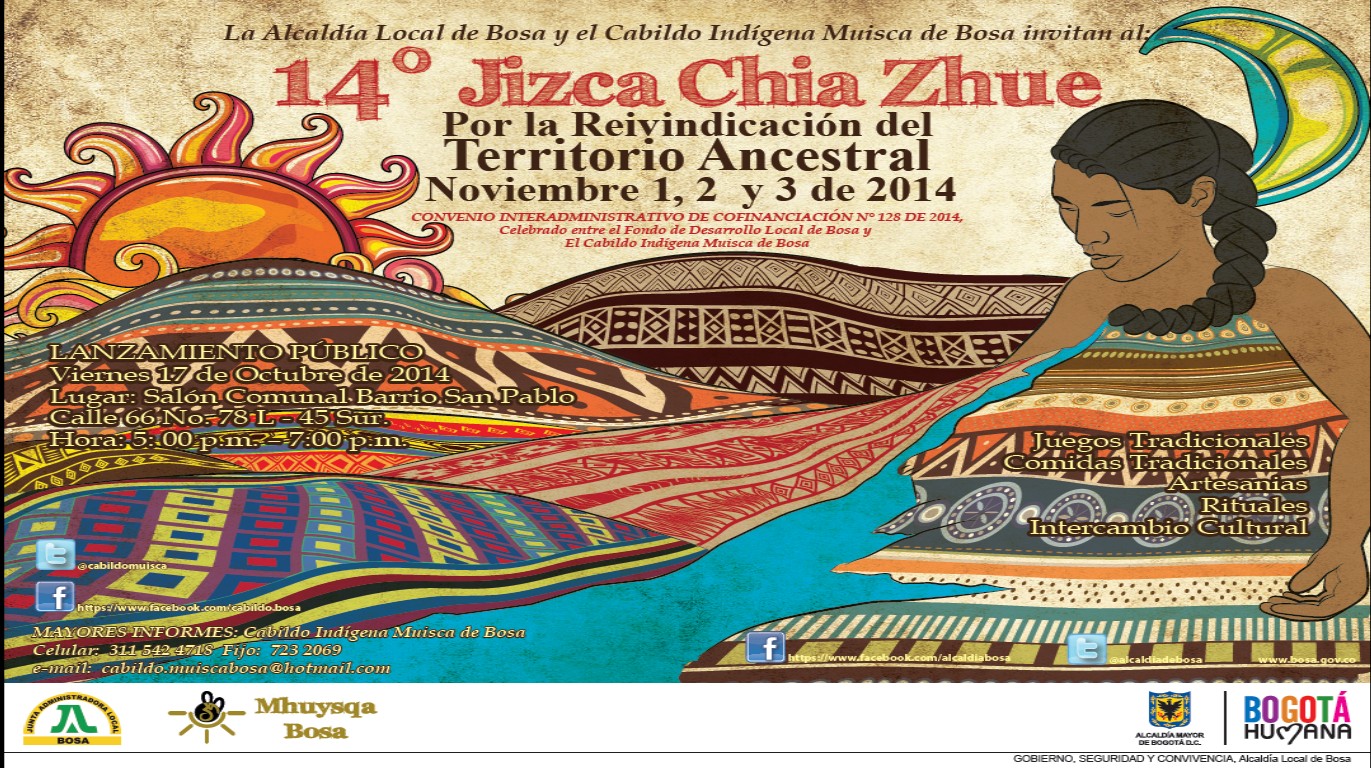
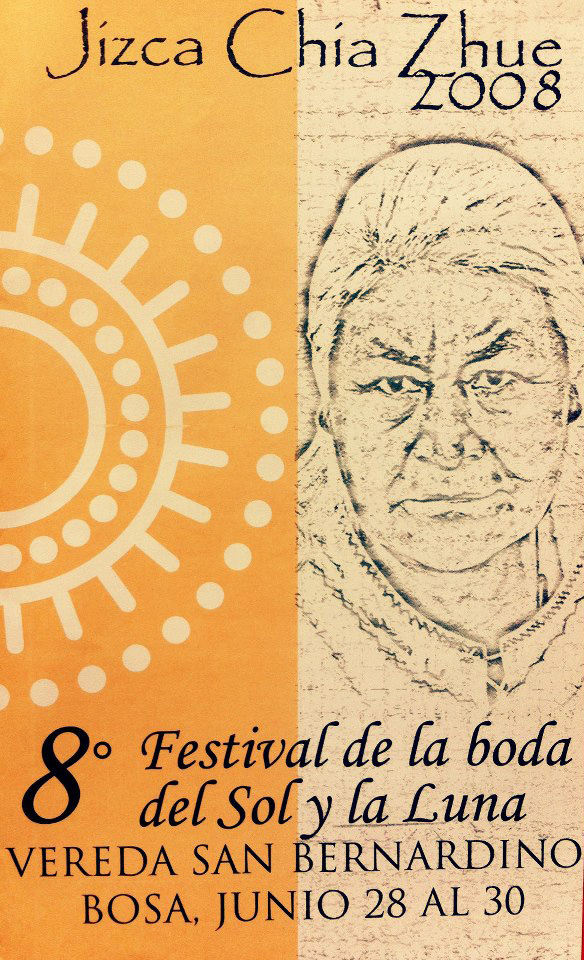
- Activities
Pagamento of opening
This ceremony is made within our tradition and customs, with the purpose of asking for permission from the grandparents of the territory and harmonizing the energies from the community. Moreover, it’s a way to pay to Mother Earth for everything done and used during the festival. It is guided by three knowledgeable women, supported by people who attend to the activity. It’s offered permanently the traditional drink -Chicha-. This activity is carried out at the Monserrate hill/volcano, which is a holy place and an important cultural site for the Muisca community; in fact, in a relevant date to the Mhuysqa schedule.
Presentation to the community
It’s made before all activities, a presentation of all the components and activities that the festival will have, prior to its development. In this one, it’s done a harmonization ritual, it’s offered food, and they are made artistic and cultural performances.
Fire change
The fire change represents equinoxes and solstices, these are the movements of the sun around the Earth. They are part of the Mhuysqa schedule that is formed and begins on March 21st which is the Mhuysqa new year represented as Fire. June 21st represents Water that is the sowing time, the solstice on September 21st is Earth, here the seed is examined and it is also checked how the growing is going. Finally, December 21st is Air, when the fruit is picked up, this process is carried out in the cusmuy of the Mhuysqa de Bosa community, with the objective of making rituals in order to get harmonization and healing in the community.
Festival
The Jizca Chia Zhue is carried out in San Bernardino village, it has the participation firstly of the Mhuysqa de Bosa community and overall the community found in the sector. Indeed, there is participation of an average of 1.000 (one thousand) people per day.
The activities shown below have a previous preparation of around 4 months before the events take place:
- Rituals that are made:
Ritual of Beginning
It's about making different kinds of offerings to the territory because of the opportunity of carrying out the activities which are planned for the festival. Besides, the respective requests are made so that the activities to do in the next days can be in harmony and without mishaps.
CHIA Ritual
This is a space where grandmothers of the territory offer the fruits to the grandmother Chia so that she can check the work done by the community. Madre receives presents for the offerings and the favors that were given. This ritual must be carried out the day Saturday at 6:00 pm which is directed by the knowledgeable women of the community and also it's offered the traditional drink called Chicha. Finally it's shared the knowledge of grandmothers to the community and it's made harmonization and healing.
ZHUE Ritual
This is a space where grandfathers of the territory offer the fruits to father Zhue so that he can check the work done by the community. Padre receives presents for the offerings and the favors that were given. This ritual must be carried out at 12:00 pm which is directed by the knowledgeable men of the community and also it's offered the traditional drink called Chicha.
Healing Pathway
This ritual is carried out not only with the participation of the traditional doctors of the Mhuysca de Bosa community but also other indigenous doctors from other communities, medicine trainees, health team and women elders. This way allows the harmonization of the being through holy plants, traditional drink and the healing and ritual music.
- Artistic Showcase:
Traditional Troupes (Comparsas)
With the purpose of giving the welcome to the festival and doing a performance to Bosa locality, slightly about the cultural and artistic process. It's carried out the troupe which starts in the central plaza of Bosa and ends in the San Bernardino settlement, place where the main events are developed. It keeps in turn, the peregrination around Bosa representing the prayers to San Isidro Labrador.
Artistic Performances
It aimed to engage the participation within the Mhuysca de Bosa community during the 3 days of Festival. This brings about the presentation of around 20 music and dance groups. Currently, 12 of the ones mentioned before belong to the Mhuysca de Bosa community, the rest belong to other indigenous groups of the Mhuysca folk of Suba, Cota, Chia and Sesquilé.
Traditional Dance Competition
It is carried out the traditional dance competition where it is sought to strengthen aspects of appropriation of dances of the religion. This competition is open to all groups, whilst they meet the requirements established.This is done since 2013 and has the participation of an average 7 dance groups or corporations. The winner groups are chosen according to the criteria previously established and also under the feedback of a group of juries experts in the issue.
Traditional Music Competition
It's made a traditional music competition where it is sought to strengthen aspects of appropriation of music of the religion. This competition is open to all groups, whilst they meet the requirements established. This is done since 2019 and has the participation of an average 6 music groups. The winner groups are chosen according to the criteria previously established.
TRADITIONAL GAMES (Juegos del Kinzhá):
It refers to the management of practices related with the traditional games, prize rod and competitions. These activities must be open to all the community and aim principally the integration and engagement of people from the community. Within the games made you will find:
- Better Chicha competition
- Better “Rellena” competition
- Minitejo
- Rana
- Racing competition inside the territory
- Marrano
- Cucunuba
- Dance competition
- Weaving
- Chicha
- Sack Race
- Spinning top
- Tab Game (Taba)
- Jizca Games (Juegos del Jizca)
Cultural Showcases:
During this festivity, there are activities related to traditional medicine, gastronomic tastings, traditional drinks, handicrafts and medicinal plants.
Other Activities:
Lunada (Moonlit gathering), myths and legends narrative, showcasing of community projects, drawing workshops, celebration of the Eucharist, exercise sessions.

Cabildo Indígena Muisca de Bosa
Copyright © 2020 Todos los derechos reservados

